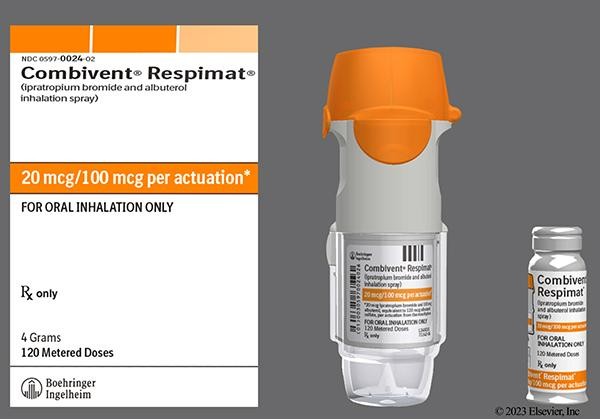
ipratropium/albuterol (salbutamol) inhaler – oral, Combivent
Medication Uses: This product treats and prevents symptoms (wheezing and shortness of breath) caused by ongoing lung disease (chronic obstructive pulmonary disease-COPD, including bronchitis and emphysema). It contains 2 medications: ipratropium and albuterol (also known as salbutamol). Both drugs relax the muscles around the airways to help you breathe more easily. Controlling breathing symptoms decreases time lost from work or school.
How to Use: Read the Patient Information Leaflet if available before using this product. Learn how to properly use this inhaler. If you have any questions, ask your doctor or pharmacist. Follow the instructions for "test-spraying" (priming) the inhaler if you are using it for the first time or after more than 24 hours. Shake the inhaler well for at least 10 seconds before each use. Inhale the medication by mouth as directed, usually 4 times daily. If prescribed, wait at least 2 minutes between two inhalations. Your doctor may also direct you to use this medication as needed. Follow your doctor’s instructions carefully. Do not exceed 12 inhalations in a 24-hour period to avoid serious side effects. The dosage is based on your medical condition and response to treatment. Rinse your mouth after using the inhaler to prevent dry mouth and throat irritation. Use this medication regularly at the same times each day for best results. Do not increase your dose or stop using it without consulting your doctor. Keep track of the number of inhalations used and discard the canister after reaching the labeled number of inhalations. Learn which inhalers to use daily and which to use for sudden breathing problems. Ask your doctor about what to do in case of worsening symptoms. Inform your doctor if your symptoms do not improve or worsen.
Side Effects: Headache, dizziness, nausea, dry mouth, shaking (tremors), nervousness, or constipation may occur. If any of these effects persist or worsen, notify your doctor or pharmacist. Severe sudden worsening of breathing problems right after use may occur infrequently. Seek immediate medical help if this happens. Report serious side effects to your doctor right away, including eye pain, vision changes, difficult/painful urination, muscle cramps, chest pain, fast/pounding/irregular heartbeat, rapid breathing, confusion, rash, itching/swelling, severe dizziness, or trouble breathing. This is not a complete list of possible side effects. Consult your doctor or pharmacist for other effects not listed.
Precautions: Inform your doctor or pharmacist if you are allergic to ipratropium or albuterol (salbutamol), tiotropium, atropine, or other belladonna-type drugs, or if you have any other allergies. This product may contain inactive ingredients that cause allergic reactions or other problems. Speak to your pharmacist for more information. Inform your doctor or pharmacist of your medical history, especially of high blood pressure, heart disease, glaucoma, difficulty urinating, seizures, overactive thyroid, or diabetes. This medication may cause dizziness or blurred vision. Avoid activities that require alertness or clear vision until you can do them safely. Limit alcohol consumption. Before surgery, inform your doctor or dentist about all products you use. Older adults may be more sensitive to the side effects, especially problems with urination or constipation. During pregnancy, use this medication only if clearly needed and discuss the risks and benefits with your doctor. It is unknown if this medication passes into breast milk. Consult your doctor before breastfeeding.
Drug Interactions: Keep a list of all the products you use and share with your doctor and pharmacist. Do not change the dosage of any medications without your doctor’s approval. If overdose is suspected, contact a poison control center or emergency room immediately. Symptoms may include chest pain, rapid/irregular heartbeat, and seizures.
Notes: This medication is for personal use only and should not be shared. Regular laboratory and/or medical tests may be performed to monitor your progress or check for side effects. Consult your doctor for more details. If you miss a dose, use it as soon as you remember. If it is close to the time for the next dose, skip the missed dose and resume your usual schedule. Do not double the dose. Store at room temperature, away from light, heat, and moisture. Do not puncture the canister or use near an open flame.
You may report negative side effects of prescription drugs to the FDA. Visit the FDA MedWatch website or call 1-800-FDA-1088.
The information in this database is intended to supplement, not substitute for, the expertise and judgment of healthcare professionals. The information is not intended to cover all possible uses, directions, precautions, drug interactions, or adverse effects. Consult a healthcare professional before taking any drug, changing your diet, or starting or stopping any treatment.


